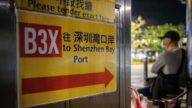【新唐人2013年06月05日讯】中共解放军副总参谋长戚建国,日前在新加坡召开的亚洲安全会议上表示,东海和南海问题现在都不具备彻底解决的条件,包括钓鱼岛,应该搁置争议,留给后人解决争端。但日本内阁官房长官菅义伟回应说:“不存在应该搁置的问题”。那么,为什么半年前,中共在钓鱼岛开展海空立体巡航,中、日两方因钓鱼岛主权问题战争一触即发,现在突然间,中共又为什么提搁置钓鱼岛争议呢?请看专家分析。
2号,中共解放军副总参谋长戚建国在亚洲安全会议上提出﹕中国与各国包括钓鱼岛问题在内的领土纠纷,可以搁置争议,留给后人解决。戚建国还拿出邓小平当年也有相似言论,为自己的说法做注脚。
据《邓小平文选》第三卷记载,1978年,邓小平访问日本,当记者提出钓鱼岛问题时,邓小平回答,这个问题可以把它放一下,留下一代解决。
但,日本内阁官房长官 菅义伟回应说﹕日本并没有与中国达成“搁置或者维持现状”的协议,根本不存在应该搁置的问题。
半年前,中共对钓鱼岛问题反映激烈,煽动民间进行各种游行和抗议,军方和媒体密集制造舆论,给人感觉中日战争一触即发。
时政评论家蓝述指出,当时,中国国内,因为中共在交接班的过程中,各派厮杀极其激烈,为了赢得军队内部鹰派的支持,中共第五代核心不得不做出要打仗的样子。
时政评论家蓝述:“现在第五代接班后,很大程度上掌控了军队,权力的换届危机基本上过去了,就回到了它的利益的考虑上,希望和日本维持一个稳定的关系,这对中共目前面临的经济形势,去解决它的经济问题是有好处的。”
大陆自由撰稿人刘逸明认为,戚建国是在代表官方表态。刘逸明说,中共对内残酷镇压自己的同胞,对外表现软弱,把钓鱼岛留给下一代解决,是中共真实的想法。
大陆自由撰稿人刘逸明:“现在中国国内存在着很多问题因素,他们非常担忧,一旦跟日本开战,两边都没办法安置好,一个是战争没办法取胜,再就是中国国内可能出现内乱。”
蓝述:“日本看清了中共的底牌,在外交上中共在周边地区,太平洋地区处于困境,在内政上,中共面临着激烈的官民矛盾,它为了维持自己的稳定,它不得不做出某些让步,所以日本呢,它就要你现在解决。”
蓝述分析指出,文革中,中共把中国的经济拖向了毁灭的边缘,为了能延续中共的统治,以邓小平为首的第二代中共领导人,急需国外的资金来拯救中国经济,为中共执政合法性提供筹码,所以急切的表达﹕中共不会和日本计较钓鱼岛。
而早在50年代初,中共刚刚上台,周边需要稳定,当时的国务院总理兼外交部长周恩来,直接发表声明﹕钓鱼岛属于日本。
蓝述说,中共这次在钓鱼岛上的表态,和前面几代没有区别,领土问题依旧是中共调节政权稳定的砝码,中共希望转移国内矛盾时,可以随时藉领土问题发挥,转移民众视线,需要国外支持或需要周边稳定时,中共又可以毫不犹豫的放弃国家领土。
1999年年底,前中共党魁江泽民和俄罗斯总统叶利钦秘密签定《中俄全面勘分边界条约》,将144万平方公里的中国领土拱手送给了俄国。这次签约,只在喉舌媒体《人民日报》作了简短报导,没有提及条约内容,令人怀疑有交易内幕。
采访编辑/刘惠 后制/钟元
Leave Diaoyu Islands Disputes?
Chinese Communist Party (CCP) Deputy Chief of
Staff of the People’s Liberation Army (PLA), Qi Jianguo,
said at a recent security conference in Singapore that
East China Sea, South China Sea and
Diaoyu (Senkaku) Islands issues can’t be resolved.
He felt that disputes should be shelved and
left to future generations.
Japan’s Chief Cabinet Secretary Jian Yiwei responded:
“The issue should not be shelved."
Six months ago, the CCP carried out a campaign
on air and sea to the Diaoyu Islands.
Due to the issue of sovereignty over the Diaoyu Islands,
a war is imminent between China and Japan.
Now all of a sudden, why does the CCP want to step aside
from the dispute? Let’s look at expert analysis:
On June 2, PLA Deputy Chief of Staff Qi Jianguo said that
territorial disputes between China and other countries,
including the Diaoyu (Senkaku) Islands issue,
can be shelved, left to the future generations.
Qi Jianguo has come up with similar remarks from
Deng Xiaoping as a footnote.
According to the Selected Works of Deng Xiaoping,
3rd volume, in 1978, Deng Xiaoping visited Japan.
When a reporter asked about the Diaoyu Islands issue,
Deng said the question can be put aside, leaving it to future generations.
However, Japan’s Chief Cabinet Secretary,
Jian Yiwei, said that
Japan did not reach an agreement with China on holding or
maintaining the status quo so the issue should not be shelved.
Six months ago, the CCP responded fiercely on the Diaoyu
Islands issue, inciting various civil demonstrations and protests.
The military and the media intensively made up public opinions,
giving the impression that a Sino-Japanese war was imminent.
Political critic Lan Shu said, the CCP was in the process
of changing shifts.
So the fighting between factions was extremely fierce
to win the support of the hawks within the army.
The fifth-generation core had to make
a gesture towards battle.
Lan Shu: “After the succession of the fifth generation,
they controlled the army.
The crisis of power changes had gone, so it returned
to considerations on interests, hoping to maintain a stable relationship with Japan.
Under the current economic situation,
it is good for the CCP to solve its economic problems."
A freelance writer Liu Yiming in China believes that
Qi Jianguo is a representative of the official position.
Liu Yiming said that the CCP brutally suppresses their
compatriots domestically, but is weak to outside forces.
It is the CCP’s real thoughts to leave the Diaoyu Islands
disputes to the next generation.
A freelance writer Liu Yiming in China:
“Now there are many problems in China.
The CCP are very worried that with a war started against
Japan, there is no way to settle both sides.
One is that there is no way to win the war, and
the other is that there may be civil unrest in China."
Lan Shu: “Japan has seen through the CCP. In diplomacy,
the CCP is in distress in the surrounding area and Pacific region.
In domestic affairs, the CCP faces fierce conflicts with citizens;
To maintain its own stability, it had to make some
concessions. But Japan wants to resolve it now."
Lan Shu analyzed that in the Cultural Revolution, the CCP
had dragged China’s economy to the edge of destruction.
To extend the rule of the CCP, the second-generation
of Communist leaders led by Deng Xiaoping urgently
needed foreign capital to rescue the Chinese economy,
providing weight to legitimize the power of the CCP.
So the CCP eagerly expressed that they did not care
about the Diaoyu Islands.
In the early 1950s, the CCP had just come to power,
and needed peripheral stability.
The Premier and Foreign Minister Zhou Enlai made direct
statements that the Diaoyu Islands belonged to Japan.
Lan Shu said, the CCP declared its position on Diaoyu Islands,
and it had no difference from the previous generations.
The territorial issues are still weights for
the CCP to maintain stability.
When the CCP wants to divert domestic attention,
it can play with territorial issues at any time.
When it needs foreign support or stability in surrounding
areas, the CCP won’t hesitate to abandon national territories.
At the end of 1999, the former CCP leader Jiang Zemin
and Russian President Boris Yeltsin signed a secret Sino-Russian comprehensive border treaty,
giving the 1.44 million sq. km. of Chinese territory
away to Russia.
The treaty signing was only reported briefly in
the mouthpiece media People’s Daily.
It did not mention the contents of the treaty,
which is suspected to have some inside trading.




















